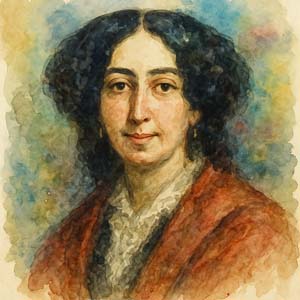~ George Sand
 Independent woman George Sand (1804–1876), born Amandine Aurore Lucile Dupin, defied expectations in every era of her life. Born into an aristocratic Parisian family, she abandoned a loveless marriage, took a man's name, and boldly followed her dreams to write.
Independent woman George Sand (1804–1876), born Amandine Aurore Lucile Dupin, defied expectations in every era of her life. Born into an aristocratic Parisian family, she abandoned a loveless marriage, took a man's name, and boldly followed her dreams to write.
“We cannot tear out a single page of our life,” she once said, “but we can throw the whole book in the fire.”
Brilliant and rebellious, Sand shocked polite society. She wore men’s clothes, smoked cigars, and wrote with unflinching honesty. She had famous love affairs with poet Alfred de Musset and composer Frédéric Chopin. In her words: “Man... is only too glad to have woman hold strictly to the Christian principle of suffering in silence.”
Biographer René Doumic called her “a genius... and daughter of Rousseau,” and praised her fire: “Vibrating with every breath, electrified by every storm, she looked up at every cloud behind which she fancied she saw a star shining.”
Her groundbreaking novel Lélia (1833) explored themes of desire, freedom, and female independence. She went on to publish more than 100 novels, plays, and essays, becoming an inspiration to Elizabeth Barrett Browning, Virginia Woolf, Victor Hugo, and generations of writers.
“There is only one happiness in life: to love and be loved.”
As she aged, Sand refused to be diminished by time. “It is a mistake to regard age as a downhill grade toward dissolution,” she wrote. “The reverse is true. As one grows older one climbs with surprising strides.”
At a time when women were expected to stay silent and proper, she wrote fiercely, loved freely, dressed how she pleased, and questioned every societal norm. She wasn’t just a novelist—she was a revolution in motion, an inspiration for all time.
 Every day we're getting better in EVERY way!
Every day we're getting better in EVERY way!
